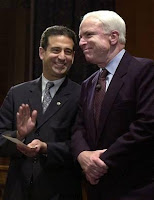This is a momentous decision, in part because of the controversy it has sparked over whether Obama has reneged on an earlier promise to accept public funding, but also because it is the first time a major-party presidential candidate has opted to forego public campaign financing since provisions were made for it in the 1974 amendments to the Federal Election Campaign Act (FECA) of 1971.
To help put the current events in context, here's an overview of the highlights of campaign finance history in the United States:
For much of the 19th century, campaigns were financed primarily through the patronage system. Parties would sponsor candidates for office; once elected, those candidates would appoint friends of their party to civil service jobs; then, the party would charge the appointees an annual fee to use for future campaigns. Once the patronage system was reformed (especially with the passage of the Pendelton Civil Service Act of 1883), this "assessment system" was no longer viable, since there were no longer enough patronage appointees to provide sufficient funds for the parties to run election campaigns. Instead, the parties turned to rich financiers -- for many years into the 20th century, political campaigns were bankrolled by wealthy individuals and corporations who provided all the funding that was needed for the parties to get out their message and mobilize voter support.
There were some early 20th-century campaign finance reform efforts, but the resulting legislation was largely ineffective. Real change came during the 1970s, especially after the Nixon Administration's Watergate scandal. The 1974 FECA amendments established strict contribution limits (on both individuals and interest groups) and disclosure requirements, restricted party spending on behalf of candidates, and established the Federal Election Commission (FEC), a federal government agency charged with administering and enforcing campaign finance laws. It also created the public funding system, which is explained here.
The 1974 legislation fundamentally changed the way money flows in and out of campaigns; it did leave one important loophole, though: while it restricted "hard money" contributions to be spent by parties on behalf of candidates' campaigns, it left "soft money" contributions, which parties could -- and did, as the graph below suggests -- use for anything that might be construed as "party building" activities.
 Most recently, in 2002 Congress passed (and the President signed) the Bipartisan Campa
Most recently, in 2002 Congress passed (and the President signed) the Bipartisan Campa ign Reform Act (BCRA), also known as the McCain-Feingold Act after its congressional sponsors (the two guys in the picture on the right). This latest law has several provisions, including restrictions on TV advertising during the 60-day period before an election and a "soft money" ban that closes up the loophole left open by the 1974 legislation. Nevertheless, while it closed up the "soft money" loophole, the 2002 law opened a new "527 group" loophole, which allows certain organizations -- those described in section 527 of the tax code -- to spend an unlimited amount on advertising that is not subject to the BCRA regulations as long as it doesn't advocate explicitly on behalf of a candidate.
ign Reform Act (BCRA), also known as the McCain-Feingold Act after its congressional sponsors (the two guys in the picture on the right). This latest law has several provisions, including restrictions on TV advertising during the 60-day period before an election and a "soft money" ban that closes up the loophole left open by the 1974 legislation. Nevertheless, while it closed up the "soft money" loophole, the 2002 law opened a new "527 group" loophole, which allows certain organizations -- those described in section 527 of the tax code -- to spend an unlimited amount on advertising that is not subject to the BCRA regulations as long as it doesn't advocate explicitly on behalf of a candidate.
Obama says the current campaign finance system is "broken" and susceptible to abuse. Do you agree? If so, what should be done to fix it?

1 comment:
This entire issue is important in the upcoming election. Being in the trenches at the Obama camp I have heard statements which tell just how important Obama's new "For the people, by the people" look on paying for the rest of his campain trail. The major issue I think you brought to light was the use and abuse of the new bipartisan campaing Reform Act. There are major loopholes in this law, as we have seen in the past election where commercials came out hounding canidates without going for a specific canidate themselves. It, in my own opinion, shows just how much of a show they put on for us citizens to get our vote. It is this lack of personal involvment which causes the canidates flaws to be seen. Basically, the campaing trail is to long and many voters are burnt out by the time it comes to actually vote.
Post a Comment